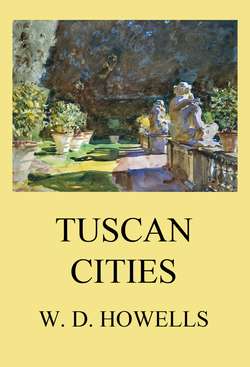Читать книгу Tuscan Cities - William Dean Howells - Страница 6
На сайте Литреса книга снята с продажи.
III
ОглавлениеOne of these was the passage of troops, infantry or cavalry, who were always going to or from the great railway station behind the church, and who entered it with a gay blare of bugles, extinguished midway of the square, letting the measured tramp of feet or the irregular clank of hoofs make itself heard. This was always thrilling, and we could not get enough of the brave spectacle. We rejoiced in the parade of Italian military force with even more than native ardor, for we were not taxed to pay for it, and personally the men were beautiful; not large or strong, but regular and refined of face, rank and file alike, in that democracy of good looks which one sees in no other land. They marched with a lounging, swinging step, under a heavy burden of equipment, and with the sort of quiet patience to which the whole nation has been schooled in its advance out of slavish subjection to the van of civilization.
They were not less charming when they came through off duty, the officers in their statuesque cloaks, with the gleam of their swords beneath the folds, striding across the piazza in twos or threes, the common soldiers straggling loosely over its space with the air of peasants let loose amid the wonders of a city, and smoking their long, straw-stemmed Italian cigars, with their eyes all abroad. I do not think they kept up so active a courtship with the nursemaids as the soldiers in the London squares and parks, but there was a friendliness in their relations with the population everywhere that spoke them still citizens of a common country, and not alien to its life in any way. They had leisure just before Epiphany to take a great interest in the preparations the boys were making for the celebration of that feast, with a noise of long, slender trumpets of glass; and I remember the fine behavior of a corporal in a fatigue-cap, who happened along one day when an orange-vendor and a group of urchins were trying a trumpet, and extorting from it only a few stertorous crumbs of sound. The corporal put it lightly to his lips, and blew a blast upon it that almost shivered our window-panes, and then walked off with the effect of one who would escape gratitude; the boys looked after him till he was quite out of sight with mute wonder, such as pursues the doer of a noble action.
One evening an officer's funeral passed through the piazza, with a pomp of military mourning; but that was no more effective than the merely civil funeral which we once saw just at twilight. The bearers were in white cowls and robes, and one went at the head of the bier with a large cross. The others carried torches, which sometimes they inverted, swinging forward with a slow processional movement, and chanting monotonously, with the clear dark of the evening light keen and beautiful around them.
At other times we heard the jangle of a small bell, and looking out we saw a priest of Santa Maria, with the Host in his hand and his taper-bearing retinue around him, going to administer the extreme unction to some passing soul in our neighborhood. Some of the spectators uncovered, but for the most part they seemed not to notice it, and the solemnity had an effect of business which I should be at some loss to make the reader feel. But that is the effect which church ceremonial in Italy has always had to me. I do not say that the Italians are more indifferent to their religion than other people, but that, having kept up its shows, always much the same in the celebration of different faiths, — Etruscan, Hellenic, Hebraic, — so long, they were more tired of them, and were willing to let it transact itself without their personal connivance when they could.
